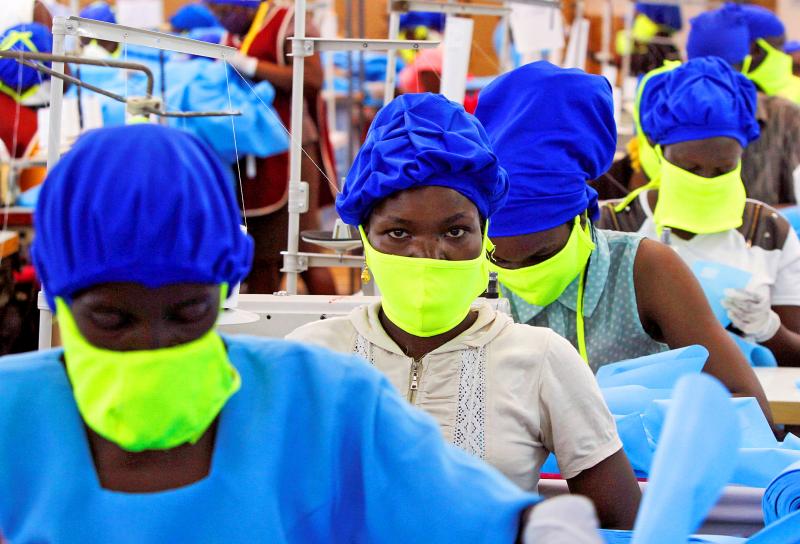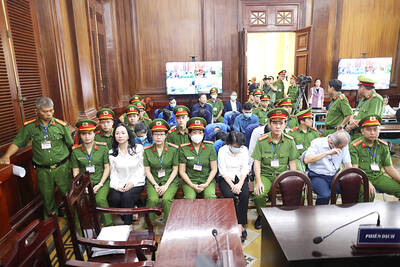Women and children fell to the ground, bloodied and trampled in a desperate surge for food being handed out in a Nairobi slum, as police fired tear gas and men with sticks beat the hungry.
As African countries grapple with the COVID-19 pandemic, observers warn that the traumatic scenes which played out on Friday last week would not be the last if governments fail to help millions of urban poor who live hand-to-mouth.
“I give them [the government] one to two weeks before things get worse. Not in terms of the coronavirus, but in terms of hunger,” said Kennedy Odede, who runs Shining Hope For Communities, a grassroots movement that works in the Nairobi slum of Kibera and other informal settlements in Kenya.

Photo: Reuters
“If it continues like this, we might be playing with fire,” Odede added.
Kenya has so far cordoned off the capital and parts of its coastline and imposed a nighttime curfew and other social distancing measures.
Many of these restrictions are having wrenching effects, causing loss of jobs among the poor, Odede said.
While Kenyan President Uhuru Kenyatta has wielded the threat of a full lockdown to get citizens to comply with the rules, officials have said that it is an agonizing choice, especially as 60 percent of Nairobi’s residents live in slums.
“Locking up people in the slums will be the last option. A lot needs to be done before that,” a high-ranking security official said on condition of anonymity.
While much of the developed world waited weeks to begin taking action, countries in Africa rapidly shut borders and banned mass gatherings.
Mauritius, Rwanda and Tunisia were the first to impose full lockdowns, with Mauritius going so far as to shut supermarkets and bakeries for 10 days.
South Africa is the biggest economy on the continent to completely confine its citizens, while Nigeria imposed lockdowns on Lagos — the continent’s largest city — and its capital Abuja, which on Monday were extended for another two weeks.
Both have millions of people packed tightly in urban slums.
“The inevitable reaction has been to follow what the rest of the world is doing,” said Jakkie Cilliers of the Pretoria-based Institute for Security Studies, which has called for Africans to come up with a “unique solution” to stave off the coronavirus crisis.
“A lockdown is unenforceable and unsustainable across much of Africa. You are trying to do something that is not possible and you are condemning people to a choice between starving and getting sick,” Cilliers said.
“It’s not possible for 10 people living in a tin shack ... to not go outside for three weeks,” Cilliers added.
In sub-Saharan Africa, Liberia and Zimbabwe have also imposed full lockdowns, but most nations across the continent have stopped short of forcing all of their citizens to stay indoors.
Madagascar and Ghana have completely locked down selected regions and towns, while Senegal, Mauritania, Guinea, Mali, Ivory Coast, Burkina Faso and Niger have imposed states of emergency and nighttime curfews.
Ethiopia, with a population of over 100 million, has closed borders and schools, and discouraged large gatherings, but has yet to restrict citizens’ movement.
“We can’t impose a lockdown like more developed nations, as there are many citizens who don’t have homes,” Ethiopian Prime Minister Abiy Ahmed said. “Even those who have homes have to make ends meet daily.”

Republican US lawmakers on Friday criticized US President Joe Biden’s administration after sanctioned Chinese telecoms equipment giant Huawei unveiled a laptop this week powered by an Intel artificial intelligence (AI) chip. The US placed Huawei on a trade restriction list in 2019 for contravening Iran sanctions, part of a broader effort to hobble Beijing’s technological advances. Placement on the list means the company’s suppliers have to seek a special, difficult-to-obtain license before shipping to it. One such license, issued by then-US president Donald Trump’s administration, has allowed Intel to ship central processors to Huawei for use in laptops since 2020. China hardliners

A top Vietnamese property tycoon was on Thursday sentenced to death in one of the biggest corruption cases in history, with an estimated US$27 billion in damages. A panel of three hand-picked jurors and two judges rejected all defense arguments by Truong My Lan, chair of major developer Van Thinh Phat, who was found guilty of swindling cash from Saigon Commercial Bank (SCB) over a decade. “The defendant’s actions ... eroded people’s trust in the leadership of the [Communist] Party and state,” read the verdict at the trial in Ho Chi Minh City. After the five-week trial, 85 others were also sentenced on

‘DELUSIONAL’: Targeting the families of Hamas’ leaders would not push the group to change its position or to give up its demands for Palestinians, Ismail Haniyeh said Israeli aircraft on Wednesday killed three sons of Hamas’ top political leader in the Gaza Strip, striking high-stakes targets at a time when Israel is holding delicate ceasefire negotiations with the militant group. Hamas said four of the leader’s grandchildren were also killed. Ismail Haniyeh’s sons are among the highest-profile figures to be killed in the war so far. Israel said they were Hamas operatives, and Haniyeh accused Israel of acting in “the spirit of revenge and murder.” The deaths threatened to strain the internationally mediated ceasefire talks, which appeared to gain steam in recent days even as the sides remain far

RAMPAGE: A Palestinian man was left dead after dozens of Israeli settlers searching for a missing 14-year-old boy stormed a village in the Israeli-occupied West Bank US President Joe Biden on Friday said he expected Iran to attack Israel “sooner, rather than later” and warned Tehran not to proceed. Asked by reporters about his message to Iran, Biden simply said: “Don’t,” underscoring Washington’s commitment to defend Israel. “We are devoted to the defense of Israel. We will support Israel. We will help defend Israel and Iran will not succeed,” he said. Biden said he would not divulge secure information, but said his expectation was that an attack could come “sooner, rather than later.” Israel braced on Friday for an attack by Iran or its proxies as warnings grew of